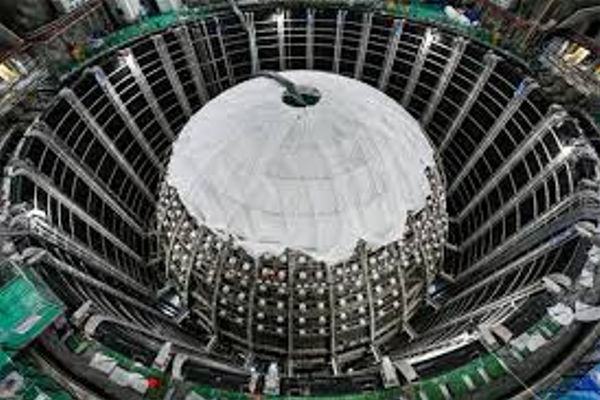Until recently, neutrino particles were thought to have no mass but now the theory is that they actually have mass with a very tiny value as well as coming in three different ‘flavours’ which they can switch back and forth. Often called ghost particles, studying them is very difficult as they typically pass through most normal matter unimpeded and undetected, so specialist detectors have to be built to hunt for them. The latest one is called JUNO, located 750m below ground in Jiangmen, China, and it is made possible by 17 different countries with 730 scientists working in 74 Universities and national laboratories, that have joined forces on this 400-million-euro project. To develop the core part of the detector, the liquid scintillator, ultrafast digitizer cards by Spectrum Instrumentation are used.
Neutrino detection
The central acrylic sphere contains the liquid scintillator surrounded by a layer of water. Both have to be ultra-pure as the smallest amount of contamination could contain a radioactive material. During construction, workers had to wear two pairs of gloves as even the sweat from a fingerprint could contaminate and ruin the entire project. The detector sits in a specially dug space that is 750 m below ground to shield it from ambient radiation.
When a neutrino interacts with the liquid scintillator (LS), it deposits the energy of the interaction with the molecules of this substance. The enormous light output of the LS (typically > 10.000 Photons / MeV) ensures a precise determination of the deposited energy. It would be highly beneficial if the direction of the incident neutrino could also be reconstructed. Here, the faint but directional Cherenkov light from neutrino’s initial passage through the water is paired to give physicists this information.
The aim of the current development of liquid scintillators in Munich and Mainz is to separate the fast but faint Cherenkov light from the dominant scintillation light in order to enable simultaneous energy and directional reconstruction. Therefore, the team under Dr. Hans Steiger constructed several, precision, table-top experiments with enhanced light-collection capabilities and time-resolution.
“We chose the digitizer cards from Spectrum as they provide us with state-of-the-art performance but, unlike rival offerings, they are not expensive or custom creations,” said Dr. Hans Steiger, who is leading the project. “Spectrum’s modular approach means that we could specify exactly what we needed the cards to do so we were not having any compromises or wasting money on unwanted features. I love the fact that they are a standard PCIe product so that we can expand the system on a standard computer chassis as we received more funds. As a university taking part in major long-term international projects, we need to have reliable parts and Spectrum’s five-year warranty gives us peace of mind.”
JUNO results also push astronomy research
Beyond the work on event reconstruction, the team contribute a calibration project to JUNO. This characterizes the detector material using radioactive gamma and neutron sources where the energy and incident direction are pre-determined. “Our characterizations of the liquid scintillators are only possible because of the ultrafast digitizer cards that enable us to work with timeframes that are measured in picoseconds. Also, the dynamic range of 5V is much better than rivals that are typically 1V which means they can easily manage the 3V pulses in our PMTs that we encounter,” Meishu Lu, a PhD student in the TUM group pointed out. And Manuel Böhles working in Mainz added, “Spectrum has been really supportive in helping us working out the best solutions for our project and helping resolve any issues that we encounter with a phone call directly with one of their engineers. It’s great that they are committed to supporting fundamental research in many universities such as ours.”
The diagram shows the first pulse from the Cherenkov radiation followed by the scintillation signal that gives the energy information. This happens in less than two nanoseconds. By combining this information, the type of particle can be determined and where it came from. This could be from one of the Chinese reactors, the sun, the heart of the earth or deep space. “We have never been able to know exactly where a neutrino was coming from in scintillation detectors before, so this opens up whole new areas of research,” explained Dr. Steiger. “If, for example, a dying star, or so-called supernova, emits large amounts of neutrinos in the sky, we are now able not only to see the neutrinos but also reconstruct with high precision, the point in the sky, where this explosion took place. Effectively we now have a telescope to look into these different neutrino sources to better understand the processes. By detecting light over the entire spectrum, gravitational waves and now also neutrinos with high statistics, energy resolution and directionality start a new era of multi-messenger astronomy.”













